Both Washington and Tehran have indicated openness to working cooperatively to quell the Iraq crisis. The Islamic State in Iraq and Syria, a Sunni militant group fighting the Assad regime in Syria, has recently taken significant territory in western Iraq and now threatens both U.S. and Iranian interests in the region. On June 19, President Barack Obama noted that Iran could play a constructive role in Iraq. Previously, President Hassan Rouhani said on June 14 that Iran could consider collaboration with the United States if it “starts confronting terrorist groups in Iraq or elsewhere.” Two days later, Secretary of State John Kerry said Washington is open to discussions with Tehran if it is “prepared to do something that is going to respect the integrity and sovereignty of Iraq and ability of the government to reform.” The following are excerpted remarks by U.S. and Iranian leaders on the crisis.
UNITED STATES
President Barack Obama
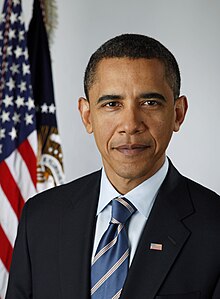 “Our view is that Iran can play a constructive role if it is helping to send the same message to the Iraqi government that we're sending, which is that Iraq only holds togethernly holds together if it’s inclusive and that -- if the interests of Sunni, Shia and Kurd are all respected. If Iran is coming in solely as an armed force on behalf of the Shia and it -- if it is framed in that fashion, then that probably worsens the situation and the prospect for a government formation that would actually be constructive over the long term.
“Our view is that Iran can play a constructive role if it is helping to send the same message to the Iraqi government that we're sending, which is that Iraq only holds togethernly holds together if it’s inclusive and that -- if the interests of Sunni, Shia and Kurd are all respected. If Iran is coming in solely as an armed force on behalf of the Shia and it -- if it is framed in that fashion, then that probably worsens the situation and the prospect for a government formation that would actually be constructive over the long term.
“Just as Iraq's leaders have to make decisions, I think Iran has heard from us. We've indicated to them that it is important to avoid the kinds of steps that might encourage the kind of sectarian splits that might lead to civil war.
“We have deep differences with Iran ... on a whole host of issues. Obviously what’s happened in Syria in part is the result of Iran coming in hot and heavy on one side. And you know, Iran obviously should consider the fact that if it is -- if its view of the region is solely through sectarian frames, they could find themselves fighting a whole lot of places. And that’s probably not good for the Iranian economy or the Iranian people over the long term either.
“I suspect there are folks in Iran who recognize that. You know, a Iraq in chaos on their borders is probably not in their interests. But old habits die hard. And you know, we’ll have to see whether they can take what I think would be a more promise path over the next several days.”
June 19, 2014 in a statement
Secretary of State John Kerry

“We're open to discussions if there is something constructive that can be contributed by Iran, if Iran is prepared to do something that is going to respect the integrity and sovereignty of Iraq and ability of the government to reform.
“I wouldn’t rule out anything that would be constructive.
“I think we are open to any constructive process here that could minimize the violence, hold Iraq together, the integrity of the country and eliminate the presence of outside terrorist forces that are ripping it apart.
The United States will give a “very thorough vetting of every option that is available,” including drone strikes. “When you have people murdering, assassinating in these mass massacres, you have to stop that — from the air or otherwise.
“The bottom line is that this is an internal struggle, which has gone on for a long time in Iraq. Shia, Sunni. It’s got overtones of Iraq’s – of Iran’s influence in Iraq. It has very serious implications with respect to other countries encouraging certain kinds of activities, and it’s much more complicated than meets the eye.
“I don’t believe that Iranian troops are coming in and crossing the border, but there is obviously a mobilization of some of the militia, no question about it. And that has its dangers, certainly."
State Department Spokesperson Jen Psaki
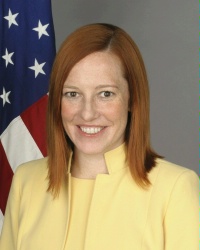
“Well, as we noted or we released last night, but let me reiterate for all of you here, Deputy Secretary Burns met briefly with Iranians on the margins of the P5+1 meeting in Vienna, separate from the trilateral meeting. It was a brief on the margins; it was separate from the discussions and the negotiations that are ongoing. They discussed the need to support inclusivity in Iraq and the need to refrain from pressing a sectarian agenda.
“In terms of where we go from here, we’re open to continuing our engagement with the Iranians, just as we are engaging with other regional players on the threat posed by ISIL in Iraq. It is likely it would – those discussions would happen at a lower level, and we don’t expect further conversations with Iran on this issue in Vienna. Those talks will focus on the nuclear issue for the remainder of the week.
“In terms of where we go from here, we’re open to continuing our engagement with the Iranians, just as we are engaging with other regional players on the threat posed by ISIL in Iraq. It is likely it would – those discussions would happen at a lower level, and we don’t expect further conversations with Iran on this issue in Vienna. Those talks will focus on the nuclear issue for the remainder of the week.
“In fact, we don't think that the focus should be on the military component in Iraq. But clearly any country that can make the argument that there needs to be unity and the sectarian tensions that have been flaming in Iraq are harmful to the stability is one we would feel is useful. That is the message that was sent from our end.
“There is a shared concern that they have expressed publicly about the stability of Iraq and the impact of ISIL That was the reason why there was a brief engagement on this on Tuesday.”
Senior Official
"We are open to engaging the Iranians, just as we are engaging other regional players on the threat post by ISIL in Iraq. The issue did come up briefly with Iran on the margins of the P5+1 in Vienna today, separate from our trilateral meeting. These engagements will not include military coordination or strategic determinations about Iraq’s future over the heads of the Iraqi people. We will discuss how ISIL threatens many countries in the region, including Iran, and the need to support inclusivity in Iraq and refrain from pressing a sectarian agenda."
June 16, 2014 in a background briefing on the nuclear talks
Senator Lindsey Graham (R- SC)

“We'll currently, probably, need their help to hold Baghdad. Their goal is to create a sectarian Iraq. To have a puppet in Baghdad, this is Shia-dominated government where they control the outcome. They want the southern part of Iraq. Our goal is to have an inclusive Iraq. But in the short term, why didn't we deal with Stalin because he was not as bad as Hitler in our eyes. We're going to have to have some dialogue with Iranians that say, let's coordinate our efforts, but put a redline to the Iranians. Don't use this crisis to take territory from the Iraqi people. Put them on notice that we will not accept their intervening into Iraq for the purpose of creating a satellite state for Iran.”
“The Iranians have an interest. They have their Shia populations to protect. We need to all make sure Baghdad doesn't fall so, yes, we need a dialogue of some kind with the Iranians, but we also need to put them on notice don't use this crisis as a way to create a satellite state of Iraq controlled by Iran.”
Senator John McCain (R- AZ)
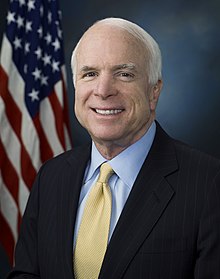
“It would be the height of folly to believe that the Iranian regime can be our partner in managing the deteriorating security situation in Iraq. This is the same Iranian regime that has trained and armed the most dangerous Shia militant groups, that has consistently urged Prime Minister Maliki to pursue a narrow sectarian agenda at the expense of national reconciliation, that supplies the rockets that have been fired at the U.S. Embassy in Baghdad, that has sponsored acts of terrorism throughout the Middle East and the world, and that continues to use Iraq’s territory and airspace to send weapons and fighters to prop up Bashar al-Assad in Syria.
“The reality is, U.S. and Iranian interests and goals do not align in Iraq, and greater Iranian intervention would only make the situation dramatically worse. It would inflame sectarian tensions, strengthen the Islamic State of Iraq and Syria (ISIS), drive more Sunnis into ISIS’s ranks, empower the most radical Shia militants, deepen the Iraqi government's dependence on Iran, alienate U.S. allies and partners in the region, and set back the prospects of national reconciliation.
“For all of these reasons, and more, the United States should be seeking to minimize greater Iranian involvement in Iraq right now, not encouraging it. That means rapid, decisive U.S. action to degrade ISIS and halt their offensive in Iraq. And it means dramatically increasing U.S. military assistance and support to moderate opposition forces in Syria that are fighting both ISIS and the Assad regime. The longer we wait to act, the more our Iraqi partners grow dependent on the Iranian regime. That is neither in our interest nor consistent with the values for which we stand.”
IRAN
President Hassan Rouhani
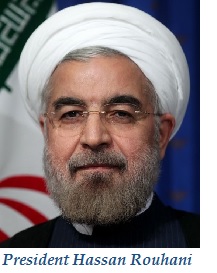
“The Islamic Republic will not tolerate violence and terror as foreign-backed takfiri militants wreak havoc in northern Iraq.
“As the government of the Islamic Republic of Iran, we will not tolerate the [acts of] violence and terror and we fight violence and terrorism in the region and in the world.
“We all should practically and verbally confront terrorist groups. We can think about it [cooperation with the United States] if we see America starts confronting the terrorist groups in Iraq or elsewhere.
“Iran has never dispatched any forces to Iraq and it is very unlikely it will ever happen.”
“Regarding the holy Shia shines in Karbala, Najaf, Khadhimiya and Samarra, we announce to the killers and terrorists that the big Iranian nation will not hesitate to protect holy shrines.
“These terrorist groups, and those that fund them, both in the region and in the international arena, are nothing, and hopefully they will be put in their own place.”
June 18, 2014 in a speech to a crowd in Lorestan province
“I advise Muslim countries that support the terrorists with their petrodollars to stop.
“Tomorrow you will be targeted... by these savage terrorists. Wash your hands of killing and the killing of Muslims.
“For centuries, Shiites and Sunnis have lived alongside each other in Iran, Iraq, the Levant, Lebanon, the Persian Gulf and North Africa...in peaceful coexistence.”
June 22, 2014, according to press
“If the Iraqi government wants help, we will study it; of course no demand has yet been raised until today but we are ready for help within the framework of the international laws and at the request of the Iraqi nation.
“Of course, we should know that help and assistance is one issue, and interference and entrance [into the battlefield] is another. If the Iraqi government demands us we will help them, but the entrance of the Iranian troops [onto the scene of battles in Iraq] has never been considered.
“Since the onset of its establishment, the Islamic Republic has never taken such measures and we have never sent our troops to another country for operations. Of course, we will provide countries with our consultative views.”
June 24, 2014, according to press
Supreme Leader Ayatollah Ali Khamenei

“We are strongly against the interference of the US and others in Iraq’s internal affairs and do not approve of it, because we believe that the Iraqi government, nation and religious authority are capable of ending this sedition and will end it, God willing.
“The United States is dissatisfied with the result of elections in Iraq and they want to deprive the Iraqi people of their achievement of a democratic system, which they achieved without U.S. interference.”
“What is happening in Iraq is not a war between Shiites and Sunnis. Arrogant powers want to use the remnants of Saddam’s regime and takfiri [ISIS] extremists to deprive Iraq of stability and tranquility.”
June 22, 2014 at a meeting with judiciary officials
Supreme National Security Council Chief Ali Shamkhani

“The current crisis in Iraq is the result of the meddling and collaboration of the western and regional enemies of the Iraqi nation, who are seeking to prevent the Iraqi people’s will and determination from coming into action.”
June 16, 2014 in a meeting with Iraq’s Kurdistan Regional Government Prime Minister Nechirvan Barzani
“Reports in Western media about possible Iran-U.S. cooperation are part of the West’s “psychological warfare” and are “completely unreal.”
“As we have announced, we will examine the issue of helping (Iraq) within the framework of international regulations in case of an official request by the Iraqi government and this will be completely a bilateral process and has nothing to do with a third country.”
Revolutionary Guards Corps Commander Maj. Gen. Mohammad Ali Jafari
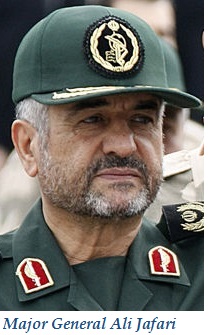 “It is the opinion of the Commander-in-Chief that no one should aid countries like Syria and Iraq unless the work is limited counselling and advising. The people and governments of these countries can overcome their problems without the aid of any country
“It is the opinion of the Commander-in-Chief that no one should aid countries like Syria and Iraq unless the work is limited counselling and advising. The people and governments of these countries can overcome their problems without the aid of any country.”
June 24, 2014 at a ceremony for martyrs of the 1980-1988 war with Iraq
Foreign Minister Mohammad Javad Zarif
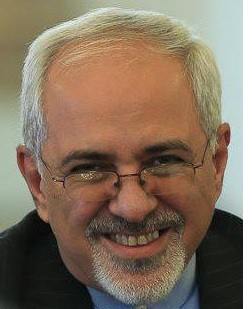
“It is in the interest of everybody to stabilize the government of Iraq. If the U.S. has come to realize that these groups pose a threat to the security of the region, and if the U.S. truly wants to fight terrorism and extremism, then it’s a common global cause.”
Foreign Ministry Spokesperson Marziyeh Afkham
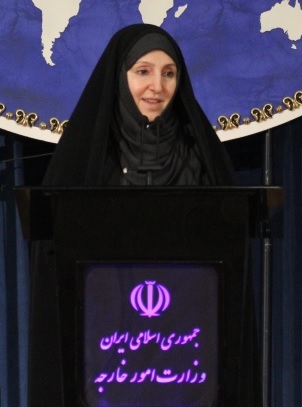
“Iraq enjoys the necessary potential and military preparedness to fight against the terrorist and extremist elements. Any move that complicates the situation in Iraq will not be in the interest of Iraq and the region.
“We believe that the Baghdad government can fully overcome the ongoing crisis in Iraq and thwart conspiracies through consolidation of national unity and internal solidarity.”
June 14, 2014 to the press
“Causing insecurity, disrupting democratic trends, overcoming ballot boxes, imposing weapons and terror rather than [promoting] democratic trends, all of these suggest that terrorism is being used today as a tool to overcome people’s votes.
“The Islamic Republic of Iran condemns the ominous phenomenon of terrorism and believes the first method to counter and eradicate it is for the regional nations to remain vigilant and for countries to boost national unity, and for the international community to pay serious and unbiased attention to this scourge facing humanity.”
June 25, 2014 to the press
Interior Minister Abdolreza Rahmani Fazli
“Supporting the Iraqi government and nation does not mean sending troops to Iraq. It means condemning terrorist acts and closing and safeguarding our joint borders.”
Center for Strategic Studies head and Rouhani advisor Hesameddin Ashna
“If the issue is about confronting extremism and violence, then yes, we’re [the United States and Iran] on the same side, but if it’s about destabilizing the region, then, no we are not.
Iran would not support a U.S. ground intervention but airstrikes could help the “paralyzed” Iraqi air force.
President Rouhani’s Deputy Chief of Staff for Political Affairs Hamid Aboutalebi
“The events in Iraq has highlighted a number of hypothesis.
“First, Iran and America are the only two countries, from a perspective of regional power, that can peacefully end Iraq’s crisis.
“Second, Iran and America have both ruled out military involvement in Iraq
“Third, both Iran and America have asked Iraq’s government and Nouri al Maliki to bring the scourge of terrorism and the problems of Iraq to an end.
“Fourth, the legitimate government of Iraq, in addition to its military capabilities, has potential political solutions worth considering to resolve problems.
“Fifth, Iran and America have both never disregarded the implicit possibility of cooperation to solve the crisis in Iraq.”
Deputy Foreign Minister for Arab and African Affairs Hossein Amir-Abdollahian
“We supply Baghdad with necessary consultations but we have no intervention in the country.”
June 16, 2014 according to Tasnim news agency
“We will mightily support Iraq in is confrontation with terrorism. We are sure that the Iraqi armed forces will powerfully and effectively crash the terrorist and takfiri forces.”
June 11, 2014 via state media
Parliamentary Speaker Ali Larijani

“The Shiites, Sunnis and Kurds are our friends [in Iraq].
“We have always insisted that all ethnic groups must have active and constructive participation in Iraq's power structure".
“We regard it as unacceptable to deprive any Iraqi ethnic group of their constitutional rights by anyone.”
June 21, 2014 according to Parliament’s website
Deputy Commander of Army Ground Forces Brig. Gen. Kiumars Heidari
“Iranian Army’s Ground Forces are not only closely monitoring the developments in Iraq and the region, but also constantly observe the different threats [coming from around the globe].”
June 16, 2014 according to Tasnim news agency
Supreme Leader Khamenei’s representative to the Revolutionary Guards Hojjatoleslam Ali Saeedi
“Saudi Arabia made a lot of efforts to upset the situation in Syria, and Qatar has also made a big investment in this regard, and some other countries made grave mistakes in Syria as well.”
June 12, 2014 according to Iranian media
Expediency Council Chairman and former President Ayatollah Akbar Hashemi Rafsanjani
“We do not want to interfere in the internal affairs of countries and we hope we will be a good mediator to extinguish the flames [of the crisis in Iraq].”
June 22, 2014 in a meeting with New Zealand Foreign Minister Murray McCully
Interior Ministry Spokesperson Hossein Ali Amiri
“There is no particular problem along our common border with Iraq; however, the necessary measures have been taken by the Interior Ministry and border police.”
June 23, 2014, according to press
Basij Militia Commander Brig. Gen. Mohammad Reza Naqdi
“The terrorist and anti-Islamic ISIL group is the US’s instrument for sowing discord among Muslims in the region.
“The US and the Israeli regime seek to use fanatics and anti-Islamic groups to damage the Islamic community.”
June 23, 2014, according to press
IRAQ
Ambassador to Tehran Mohammad Majid al Sheikh
“These are just the rumors of biased and despiteful media which are seeking to sow discord among the regional states, specially Iran and Iraq.
“Iraq doesn’t need any country neither for weapons nor for the military forces at all; hence, I emphasize that neither General [Qassem] Soleimani nor any other (Iranian) figure is in Iraq.”
June 24, 2014, according to press
Photo credits: President.ir, Khamenei.ir, Iran's Ministry of Defense, Iran's Ministry of Foreign Affairs, Ali Larijani by Harald Dettenborn [CC-BY-3.0-de (http://creativecommons.org/licenses/by/3.0/de/deed.en)], via Wikimedia Commons,
 “Our view is that Iran can play a constructive role if it is helping to send the same message to the Iraqi government that we're sending, which is that Iraq only holds togethernly holds together if it’s inclusive and that -- if the interests of Sunni, Shia and Kurd are all respected. If Iran is coming in solely as an armed force on behalf of the Shia and it -- if it is framed in that fashion, then that probably worsens the situation and the prospect for a government formation that would actually be constructive over the long term.
“Our view is that Iran can play a constructive role if it is helping to send the same message to the Iraqi government that we're sending, which is that Iraq only holds togethernly holds together if it’s inclusive and that -- if the interests of Sunni, Shia and Kurd are all respected. If Iran is coming in solely as an armed force on behalf of the Shia and it -- if it is framed in that fashion, then that probably worsens the situation and the prospect for a government formation that would actually be constructive over the long term. “We're open to discussions if there is something constructive that can be contributed by Iran, if Iran is prepared to do something that is going to respect the integrity and sovereignty of Iraq and ability of the government to reform.
“We're open to discussions if there is something constructive that can be contributed by Iran, if Iran is prepared to do something that is going to respect the integrity and sovereignty of Iraq and ability of the government to reform. “Well, as we noted or we released last night, but let me reiterate for all of you here, Deputy Secretary Burns met briefly with Iranians on the margins of the P5+1 meeting in Vienna, separate from the trilateral meeting. It was a brief on the margins; it was separate from the discussions and the negotiations that are ongoing. They discussed the need to support inclusivity in Iraq and the need to refrain from pressing a sectarian agenda.
“Well, as we noted or we released last night, but let me reiterate for all of you here, Deputy Secretary Burns met briefly with Iranians on the margins of the P5+1 meeting in Vienna, separate from the trilateral meeting. It was a brief on the margins; it was separate from the discussions and the negotiations that are ongoing. They discussed the need to support inclusivity in Iraq and the need to refrain from pressing a sectarian agenda. “We'll currently, probably, need their help to hold Baghdad. Their goal is to create a sectarian Iraq. To have a puppet in Baghdad, this is Shia-dominated government where they control the outcome. They want the southern part of Iraq. Our goal is to have an inclusive Iraq. But in the short term, why didn't we deal with Stalin because he was not as bad as Hitler in our eyes. We're going to have to have some dialogue with Iranians that say, let's coordinate our efforts, but put a redline to the Iranians. Don't use this crisis to take territory from the Iraqi people. Put them on notice that we will not accept their intervening into Iraq for the purpose of creating a satellite state for Iran.”
“We'll currently, probably, need their help to hold Baghdad. Their goal is to create a sectarian Iraq. To have a puppet in Baghdad, this is Shia-dominated government where they control the outcome. They want the southern part of Iraq. Our goal is to have an inclusive Iraq. But in the short term, why didn't we deal with Stalin because he was not as bad as Hitler in our eyes. We're going to have to have some dialogue with Iranians that say, let's coordinate our efforts, but put a redline to the Iranians. Don't use this crisis to take territory from the Iraqi people. Put them on notice that we will not accept their intervening into Iraq for the purpose of creating a satellite state for Iran.” “It would be the height of folly to believe that the Iranian regime can be our partner in managing the deteriorating security situation in Iraq. This is the same Iranian regime that has trained and armed the most dangerous Shia militant groups, that has consistently urged Prime Minister Maliki to pursue a narrow sectarian agenda at the expense of national reconciliation, that supplies the rockets that have been fired at the U.S. Embassy in Baghdad, that has sponsored acts of terrorism throughout the Middle East and the world, and that continues to use Iraq’s territory and airspace to send weapons and fighters to prop up Bashar al-Assad in Syria.
“It would be the height of folly to believe that the Iranian regime can be our partner in managing the deteriorating security situation in Iraq. This is the same Iranian regime that has trained and armed the most dangerous Shia militant groups, that has consistently urged Prime Minister Maliki to pursue a narrow sectarian agenda at the expense of national reconciliation, that supplies the rockets that have been fired at the U.S. Embassy in Baghdad, that has sponsored acts of terrorism throughout the Middle East and the world, and that continues to use Iraq’s territory and airspace to send weapons and fighters to prop up Bashar al-Assad in Syria. “The Islamic Republic will not tolerate violence and terror as foreign-backed takfiri militants wreak havoc in northern Iraq.
“The Islamic Republic will not tolerate violence and terror as foreign-backed takfiri militants wreak havoc in northern Iraq. “We are strongly against the interference of the US and others in Iraq’s internal affairs and do not approve of it, because we believe that the Iraqi government, nation and religious authority are capable of ending this sedition and will end it, God willing.
“We are strongly against the interference of the US and others in Iraq’s internal affairs and do not approve of it, because we believe that the Iraqi government, nation and religious authority are capable of ending this sedition and will end it, God willing. “The current crisis in Iraq is the result of the meddling and collaboration of the western and regional enemies of the Iraqi nation, who are seeking to prevent the Iraqi people’s will and determination from coming into action.”
“The current crisis in Iraq is the result of the meddling and collaboration of the western and regional enemies of the Iraqi nation, who are seeking to prevent the Iraqi people’s will and determination from coming into action.” “It is in the interest of everybody to stabilize the government of Iraq. If the U.S. has come to realize that these groups pose a threat to the security of the region, and if the U.S. truly wants to fight terrorism and extremism, then it’s a common global cause.”
“It is in the interest of everybody to stabilize the government of Iraq. If the U.S. has come to realize that these groups pose a threat to the security of the region, and if the U.S. truly wants to fight terrorism and extremism, then it’s a common global cause.” “Iraq enjoys the necessary potential and military preparedness to fight against the terrorist and extremist elements. Any move that complicates the situation in Iraq will not be in the interest of Iraq and the region.
“Iraq enjoys the necessary potential and military preparedness to fight against the terrorist and extremist elements. Any move that complicates the situation in Iraq will not be in the interest of Iraq and the region. “The Shiites, Sunnis and Kurds are our friends [in Iraq].
“The Shiites, Sunnis and Kurds are our friends [in Iraq].